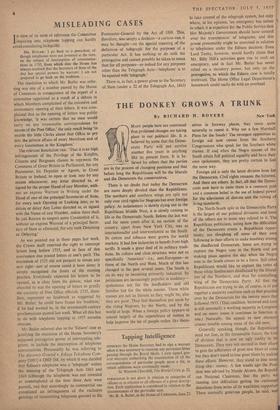MISLEADING CASES
TN view of its term of reference the Committee 'inquiring into telephone tapping can hardly avoid considering its legality.
MR. BUTLER : I go back to a precedent, al- though telephones were not invented at the time, on the subject of interception of communica- tions in 1735, from which date the House has always resolved that the Secretary of State of the
day has special powers by warrant. I am not prepared to go back on the tradition. . . .
The resolution to which Mr. Butler was refer- ring was one of a number passed by the House of Commons in consequence of the report of a committee appointed as a result of a debate in which Members complained of the extensive and unnecessary opening of their letters. It was com- plained that as the opening of letters was public knowledge, 'it was certain that no men would carry on any treasonable correspondence by means of the Post Office,' the only result being `to enable the little Clerks about that Office to pry into the private affairs of every Merchant and of every Gentleman in the Kingdom.'
The relevant Resolution ran: 'That it is an high infringements of the Privilege of the Knights, Citizens and Burgesses chosen to represent the Commons of Great Britain in Parliament, for any Postmaster, his Deputies or Agents, in Great Britain or Ireland, to open or look into by any means whatsoever, any letter directed to, or signed by the proper Hand of any Member, with- out an express Warrant in Writing under the Hand of one of the principal Secretaries of State, for every such Opening or Looking into; or to detain or delay Any Letter directed to, or signed with the Name of any Member, unless there shall be just Reason to suspect some Counterfeit of it, without an express Warrant of a principal Secre- tary of State as aforesaid, for any such Detaining or Delaying.'
As was pointed out in these pages last week, the Crown itself reserved the right to intercept letters long before 1735, and in face of this reservation one posted letters at one's peril. The resolution of 1735 did not purport to create any new right—nor of course could it have done; it simply recognised the limits of the existing practice. Everybody expected his letters to be opened, as is clear from the debate; what was objected to was the opening of letters to gratify the curiosity of Post Office officials. 1735, there- fore, represents no landmark as suggested by Mr. Butler; he could have found his 'tradition,' if he had wanted to, in the seventeenth-century proclamations quoted last week. What all this has to do with telephone tapping in 1957 remains obscure.
Mr. Butler referred also to the 'Edison' case as justifying the extension of the Home Secretary's supposed prerogative power of intercepting tele- grams, to include the interception of telephone conversations. Presumably he was referring to The Attorney-General v. Edison Telephone COM- pony [1881] 6 QBD 244, by which it was decided that Edison's telephone was a 'telegraph' within the meaning of the Telegraph Acts 1863 and 1869 (although the telephone was not invented or contemplated at the time these Acts were passed), and that accordingly its commercial use constituted an infringement of the exclusive privilege of transmitting telegrams granted to the
Postmaster-General by the Act of 1869. This, therefore, was simply a decision—a curious one, it may be thought—on the special meaning of the definition of 'telegraph' for the purposes of a particular Act. It has nothing to do with the prerogative and cannot possibly be taken to mean that for all purposes—or indeed for any purposes other than the Telegraph Acts—'telephone' is to be equated with 'telegraph.'
There is, in fact, a power given to the Secretary of State (under s. 52 of the Telegraph Act, 1863) to take control of the telegraph system, but only where, in his opinion, 'an emergency has arisen in which it is expedient for the Public Service that Her Majesty's Government should have control over the transmission' of telegrams; and this power presumably might be exercised in relation to telephones under the Edison decision. Even Lord Tenby, however, would hardly claim that Mr. Billy Hill's activities gave rise to such an emergency, and in fact Mr. Butler has never relied on a statutory power, but only on the prerogative, to which the Edison case is totally irrelevant. The Home Office Legal Department's homework could really do with an overhaul.














































 Previous page
Previous page